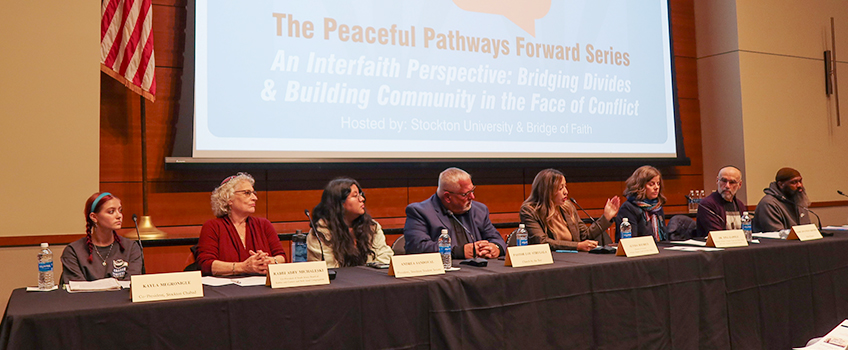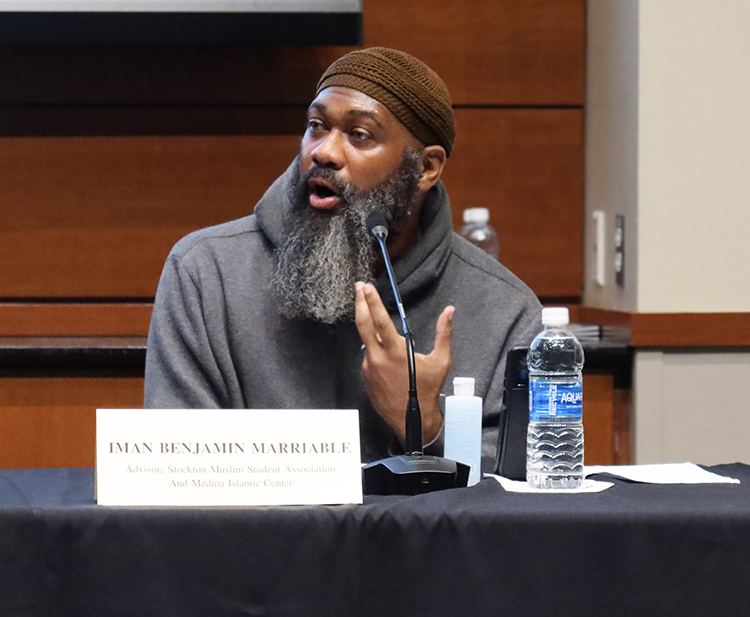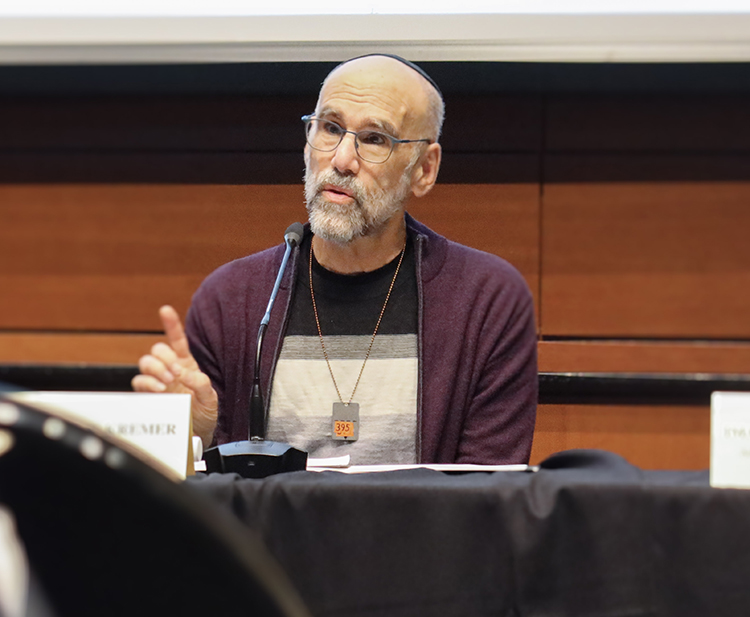Interfaith Panel Tries to Bridge Divides, Build Community

From left, Kayla Megronigle, co-president of Stockton Chabad; Rabbi Abby Michaleski, of Beth Israel Congregation in Vineland and co-president of the South Jersey Board of Rabbis and Cantors; Andrea Sandoval, president of the Stockton University Student Senate; Pastor Lou Strugala, of Church by the Bay in Galloway Township; Alyssa Hughes, research director of the William J. Hughes Center for Public Policy; Tina Zappile, the director of the Hughes Center; Rabbi Jonathan Kremer, of Shirat Hayam in Ventnor; and Imam Benjamin Marriable, advisor to the Stockton Muslim Student Association and Imam of the Medina Islamic Center in Pleasantville. The panelists took part in a discussion titled 'An Interfaith Perspective: Bridging the Divides & Building Community in the Face of Conflict.'
Galloway, N.J. — Bringing people together in a public space to share different perspectives and listen to others with empathy can be a powerful way to bridge divides and build community.
That was one of the main themes of an interfaith panel discussion held Nov. 4 in the Michael Jacobson Board of Trustees Room at Stockton University. The discussion was part of the Peaceful Pathways Forward series started this fall. Other events this semester included a Good Neighbor Walk on the Atlantic City Boardwalk in front of Kesselman Hall on Oct. 27 and a day of prayer, meditation and understanding on Oct. 7.
“These programs evolved as a result of our commitment to providing spaces for our community to engage in conversations about what’s happening here and throughout the world, and our ongoing collaboration and partnership with community-based Bridge of Faith, which represents a diverse group of clergy and lay leaders from throughout the community,” said Brian K. Jackson, vice president for Community Engagement at Stockton.
The panelists included:
- Rabbi Jonathan Kremer, of Shirat Hayam in Ventnor
- Imam Benjamin Marriable, advisor to the Stockton Muslim Student Association and Imam of the Medina Islamic Center in Pleasantville
- Rabbi Abby Michaleski, of Beth Israel Congregation in Vineland and co-president of the South Jersey Board of Rabbis and Cantors
- Andrea Sandoval, president of the Stockton University Student Senate
- Pastor Lou Strugala, of Church by the Bay in Galloway Township
- Kayla Megronigle, co-president of Stockton Chabad
“Empathy does not require you to agree, but it does require you to listen and hold space for other people, including their emotions,” said Tina Zappile, the director of the William J. Hughes Center for Public Policy at Stockton, who moderated the discussion along with Hughes Research Director Alyssa Maurice.
“In that spirit, let’s acknowledge the grief and anger in our community, and why we are here today — to talk about how faith informs your role in the public sphere, and how you engage with others in your community,” Zappile said.
The discussion was framed around four questions. The following is a recap of some of the answers from the panel:
Can you talk about how you help your community navigate what’s happening in the outside world?

We will all have differences, and we may come from different parts of the world, and we may have different experiences, but in the dialogue of unity, we look for what joins us instead of what divides us."Imam Benjamin Marriable
Imam Benjamin Marriable: First and foremost, we teach fairness. We welcome Muslims and non-Muslims alike into our center. … In the efforts of teaching fairness, we see the dilemma of misrepresentation from extremism and the lack of education about our Islamic customs and traditional heritage. … We will all have differences, and we may come from different parts of the world, and we may have different experiences, but in the dialogue of unity, we look for what joins us instead of what divides us.
Pastor Lou Strugala: I think the most important thing is listening to the other person, having a conversation and allowing us to share ideas and share thoughts. And how do we move forward? How do we get this to a position of being benefactors to the world not takers from the world because, after all, that’s what God does — he benefacts all of us.
Rabbi Abby Michaleski: I begin by being as present as I can and letting my community know that I am available. And that we need to be there for each other, both in our own community and outside of the community, regardless of what’s happening. … I also believe that a core teaching of Judaism is that things can change and that we have the ability to make things change.
Kayla Megronigle: Judaism teaches us that everything that happens in the world is from God and that nothing happens by chance, and that we may not understand why it’s happening, but that it’s from God. But we are also taught that people have free will. With that in mind, we are also taught that every action that we do makes an actual change in the world. So, we can use misfortune as a catalyst to do more acts of goodness and kindness.
How do you experience and see extremism in your own religion, and how do you address it in your own faith community?
Michaleski: Extremism is in all religions. Speaking for myself, not for my congregation, not for the Jewish people, but speaking for myself, I see extremism in Judaism. I see it in the United States. I see it in Israel. … My own experience is that our community will not talk about it. We will avoid it because it is such a loaded issue and many within my community are afraid to talk about it. They are afraid to raise the issue for fear, if you criticize, you are a bad Jew, or an anti-Semite. … It’s very, very unfortunate. And I don’t know how to change it. It’s been happening for a long time.
Strugala: My view of extremism is a simple analogy. It’s like having your feet stuck in mud and screaming loudly. You don’t move. You don’t get closer. You don’t have a position because you’re still stuck in the mud. Until you are willing to get yourself out of the mud, you are going to be extreme. … Why can’t we come together? Why can’t we get our feet out of the mud to have an honest conversation about what’s happening? Whether it be Christians and Jews, Muslims and Christians, it just doesn’t matter because we all worship a God.
Marriable: The way that we have chosen to deal with these issues is education. … We need to confront these problems and educate properly the Muslim community. … And identifying extremism as a cancer, as something that doesn’t belong.
How do you secure your place of worship, and has the need for security measures changed over the last decade?

Since October 2018, with the massacre at Tree of Life synagogue and it was exacerbated by Oct. 7, 2023, in Israel, our synagogue has had armed security guards at the front door for any public advertised event. … No house of worship should need that kind of protection from fear in this country.Rabbi Jonathan Kremer
Kremer: Since October 2018, with the massacre at Tree of Life synagogue and it was exacerbated by Oct. 7, 2023, in Israel, our synagogue has had armed security guards at the front door for any public advertised event and for our Sunday school. … We have all new windows that have bullet-resistant glass. We have front doors that have bullet-resistance glass. …Because of fear of extremists and extremism. No house of worship should need that kind of protection from fear in this country.
Strugala: One of the most difficult things to admit is that we no longer see churches, synagogues or mosques as sacred spaces. I long for the days of sacred spaces. … I wish sometimes to go back to the ‘60s, but it’s not going to happen. We just have to learn to be very, very security conscious.
Marriable: One of the fundamental principles of our religion is that respect for all religious faiths is a must. So that means churches and synagogues have always been sacrosanct in Islam, despite what you may see in the media. It’s just now the representatives of true Islam are such a minority voice. … It’s panels like this where you finally get a chance to hear something different from what you see on the media. … I think security is a must and it should be encouraged until we weed out the differences of extremism from among us.
How does your faith inform your involvement in civic life or public life?
Michaleski: It’s a really a contract. The government and the divine are to work together for the betterment of the people. … As Jews, as part of that system, we have an obligation to be involved and to be in that partnership. And if we are going to take resources from the community that we live in, we are also obligated to give back to that system — meaning helping the poor and those who have less.
Sandoval: One of the senate’s goals is having students participate in civic engagement. So, we had a voter registration drive. And we were really focused on mail-in ballots and absentee ballots because we have a lot of students that live out of the county or out of the state and can’t go home. … This is Gen Z’s first presidential election, and I thought, and all of the Senate thought, that it was important to make sure that students have the ability to vote.
Strugala: I tend to look at this a little more secularly first. We sit here today because we are free. There are many, many countries where this freedom doesn’t exist. Where the idea of a panel coming together and having different opinions, trying to find solutions without someone mandating it over our head is not common in much of the world. … We need to look at voting as a spiritual aspect to our country.
Marriable: We see voting as a civic duty, and as Muslims there is an obligation to be involved and engaged. However, speaking from not just a Muslim perspective but also an African American perspective, it is more of an obligation for many of us to teach and represent the informed vote. Because without the informed vote we are just senselessly following the process. … We have to get into the habit of teaching the informed vote.
-- Story by Mark Melhorn, photos by Lizzie Nealis


